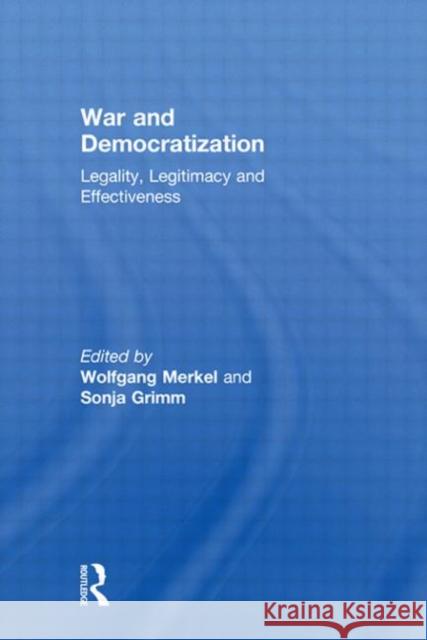War and Democratization: Legality, Legitimacy and Effectiveness » książka
War and Democratization: Legality, Legitimacy and Effectiveness
ISBN-13: 9780415480871 / Angielski / Twarda / 2009 / 226 str.
War and Democratization: Legality, Legitimacy and Effectiveness
ISBN-13: 9780415480871 / Angielski / Twarda / 2009 / 226 str.
(netto: 676,35 VAT: 5%)
Najniższa cena z 30 dni: 654,86
ok. 22 dni roboczych.
Darmowa dostawa!
Promotion of democracy in post-war and post-conflict societies became a topic during the 1990s. The book deals with the legality, legitimacy and effectiveness of military interventions where the international community of states not only felt impelled to engage in military humanitarian or peace-building missions but also in long-term state- and democracy-building. External actors particularly engaged in four modes, namely enforcing democratization by enduring post-war occupation (mode 1); restoring an elected government by military intervention (mode 2); intervening in on-going massacres and civil war with military forces ('humanitarian intervention') and thereby curbing the national sovereignty of those countries (mode 3) and forcing democracy on rogue states by 'democratic intervention', in other words democracy through war (mode 4). The contributions link juridical and philosophical reflections on just war ad bellum with empirical evidence post bellum in Afghanistan, Georgia, Serbia, Croatia, Cambodia and East Timor. All empirical analyses stress the complexity and difficulties to establish democracy in post-conflict societies driven or monitored by external actors. Such an endeavour implies a comprehensive agenda of political, social, and economic methods of peace-building. However, if external actors withdraw before the roots of democracy are deep enough and before democratic institutions are strong enough to stand alone, then the entire endeavour may fail. This book was originally published as a special issue of Democratization.
Promotion of democracy in post-war and post-conflict societies became a topic during the 1990s. The book deals with the legality, legitimacy and effectiveness of military interventions where the international community of states not only felt impelled to engage in military humanitarian or peace-building missions but also in long-term state- and democracy-building. External actors particularly engaged in four modes, namely enforcing democratization by enduring post-war occupation (mode 1); restoring an elected government by military intervention (mode 2); intervening in on-going massacres and civil war with military forces (‘humanitarian intervention’) and thereby curbing the national sovereignty of those countries (mode 3) and forcing democracy on rogue states by ‘democratic intervention’, in other words democracy through war (mode 4). The contributions link juridical and philosophical reflections on just war ad bellum with empirical evidence post bellum in Afghanistan, Georgia, Serbia, Croatia, Cambodia and East Timor. All empirical analyses stress the complexity and difficulties to establish democracy in post-conflict societies driven or monitored by external actors. Such an endeavour implies a comprehensive agenda of political, social, and economic methods of peace-building. However, if external actors withdraw before the roots of democracy are deep enough and before democratic institutions are strong enough to stand alone, then the entire endeavour may fail.
This book was originally published as a special issue of Democratization.











